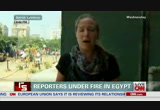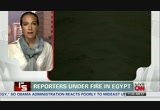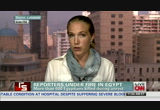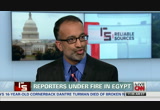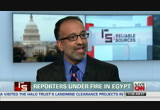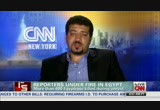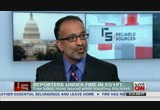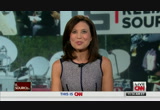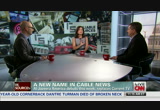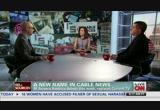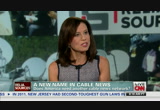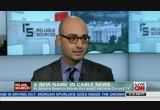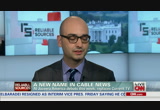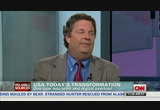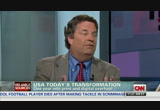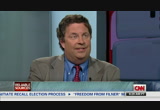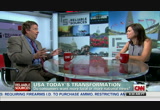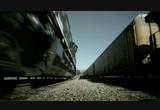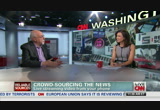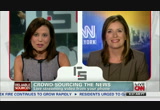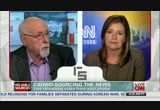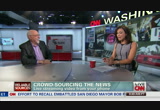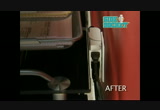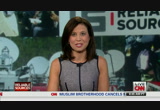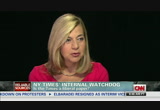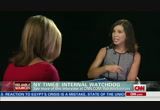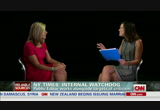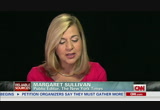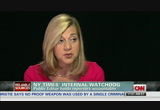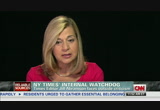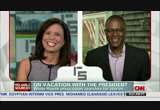tv Reliable Sources CNN August 18, 2013 8:00am-9:01am PDT
8:00 am
still, the wall couldn't stop over 5,000 people from escaping from east germany. thanks to all of you for being part of my program this week. i will see you next week. stay tuned for "reliable sources." a grim week in egypt as more than 600 die in violent clashes, including four journalists just trying to do their jobs. are journalists being targeted? we'll talk with the cnn correspondent who dodged bullets on camera, while reporting from cairo this week and we'll look at the dangers faced by all reporters on the job. there's a new name in cable news starting tuesday that promises to reinvent american journalism. but will that name, al jazeera, scare away potential viewers as it tries to take on the likes of cnn, msnbc and fox? and if you don't trust journalists, you aren't alone.
8:01 am
a new survey finds most americans don't. at "the new york times" it's the job of public editor margaret sullivan to hold reporters accountable, and boy, has she been outspoken. we'll talk with her about what the paper of record is doing wrong and right. and perhaps you've seen this gripping news report from president obama's vacation in martha's vineyard this week. >> after arriving here in martha's vineyard, there was a bit more visibility of something else. the president's golf game. >> but as the first day of the agenda, do you go to the black dog, do you go to oak bluffs, what do you do? >> i expect throughout the week we'll see him take a few trips to get ice cream. >> yep, it's the annual rite of summer as the press descends on the president's vacation and tries to make news. we'll look at just how creative they can get. i'm joanne lipman, and this is "reliable sources."
8:02 am
egypt dominated the headlines this week as the military cracked down on supporters of former president mohamed morsi, who was ousted last month. more than 600 people have been killed, more than 4,000 injured over the past four days. the violence in cairo has taken a grim toll on members of the media covering the protests. sky news cameraman nick dean, who died after being shot on wednesday, was the 1,000th journalist killed in the line of duty since 1992 when the committee to protect journalists began keeping track. cnn's arwa damon was in the middle of the chaos in cairo this week. >> reporter: some of the hard-core supporters, we will see them out there. at the same time you have -- [ gunfire ] we're okay.
8:03 am
>> arwa joins us now from beirut, another middle eastern capital, that has seen violence this week after a car bomb killed 18 and injured nearly 300. arwa, welcome. we've just seen this video of you. >> reporter: thank you. >> we've just seen video of you ducking bullets. walk us through that scene. tell us a little bit about the background. what happened there? >> reporter: well, we arrived at one of the squares that the pro-morsi demonstrators were trying to take over after they had been assaulted, attacked in the main two cairo sit-in areas. they were trying to establish themselves in this new location. we arrived, we could hear a gunfire in the background. it seemed to be coming from the other side of the square from where we were standing. the demonstrators that were in the square itself seemed to be fairly relaxed and all of a sudden in the middle of that live broadcast, one bullet, very distinct sound, that hissing sound going past one's ear,
8:04 am
ducked for cover and then pretty intense gunfire. what you don't see because the video cuts out is that afterwards, even while we were trying to leave, there was still gunfire seeming to be coming directly at our location. >> so was it your sense that you were the target? >> you know, that's a very harsh assessment to make. it's one that one most certainly doesn't want to make, but it's very difficult to see how if a gun battle is happening on the other side of the square there was all of a sudden that intense barrage of gunfire right next our location. most certainly we did not see who was shooting at us, we could not determine who had the weapons at that point, but it does raise a lot of questions, especially given that mick had been shot earlier in the day and that other journalists were in fact being threatened, being detained. one writer for "the washington post" was told by a police officer that if he saw her again, he would shoot her in the
8:05 am
leg. look, at the end of the day, egypt is not a country that is known for being particularly friendly towards the media, especially the western media. >> well, we are so glad that you're safe. stay safe and thank you for joining us. we'd like to turn to rajiv chandrasekaran, senior correspondent and cairo reporter for "the washington post" and in new york, sherif mansour, middle east and north african program coordinator for the committee to protect journalists. rajiv, this is so disturbing, this video. you have been bureau chief for "the washington post," you've covered the iraq war. do you feel that journalists are being specifically targeted now in a way that they were not before? >> well, i think there's a degree of immunity, if you will, that no longer cloaks journalists. some might accuse me of looking at the past with rose-tinted glasses, but a generation or so ago, particularly in the middle east, you would see journalists
8:06 am
driving around in cars with the words tv 'em blazened on the sides and walk around in flak jackets with the word "press" on the front and the back. and generally speaking, that gave you like if you had a red cross on your jacket, it gave you a degree of free passage through. you were generally not targeted. now we've seen in the iraq war, certainly some very questionable, disturbing developments in the last week in egypt and in other conflicts in that part of the world and beyond that the journalists are seen as fair game. in some cases, they're seen as lucrative kidnapping targets. in other cases what you have are various parties to a conflict, joanne, seeing that perhaps objecting to the coverage. believe that they don't think it's fair or representing their particular point of view, so they're going to get their anger out by targeting journalists. and in other cases, it's simply unruly mobs perhaps affiliated with various parties to a conflict. for instance, these popular committees that are operating
8:07 am
the streets of cairo, these thugs who are taking matters into their own hands, allowing official authorities a degree of plausible deniability saying we're not targeting them but maybe their allies are. >> which raises a good question. sherif, talk a little about egypt and what's going on here. i've read some of your comments where you said you think it's become more dangerous for journalists. >> the numbers don't lie. we've been documenting the attacks on journalists in egypt since 1992. and over the course of 19 years under mubarak, there was only one case of journalist being killed. after the revolution, you've seen one being killed under the military leadership in a total period of 18 months. then under president morsi, you see two have been killed within a year. and since the military took over, and that's six weeks ago, four have been killed. so look at it this way, nine
8:08 am
journalists have been killed since 1992, and four since last month. so of course there is an increase in terms of quantity here that you can see that there is specific targeting for journalists in terms of number. >> so there's a change in the attitude, it seems, under this morsi regime with pro and anti-morsi forces? >> absolutely. it didn't start with the military, let's be clear. the targeting journalists and intimidation tactics and physical assaults have been consistent under president morsi. and we've -- over the course of one year, we've seen and documented 78 cases of violence that mostly it was against the local journalists, that's why it wasn't promoted widely and didn't reach the news. but now that we see that foreign journalists are being targeted, too the journalists who have been killed on wednesday, this
8:09 am
is the first time foreign journalists have been killed in egypt. so out of the nine people we've documented there wasn't specific foreign journalists but there is a sense that the current regime is promoting. we see that all the time. they have initiated new rules for foreign journalists. we've seen that they have started publicly blaming foreign journalists and saying that they are biased. >> so that actually raises an interesting question that i want to direct to rajiv. you mentioned that the press used to be given a measure of safety by 'em blazening themselves with and they were sort of off limits. does the fact that there are so many people out there with cell phones, anyone can be a journalist. so it's more difficult to tell the difference between a professional journalist working for a large news organization versus someone that's a citizen
8:10 am
journalist. >> i think it certainly adds to this whole dynamic. for instance, in cairo today, you've got a lot of egyptian citizen journalists. you also have a lot more western free lancers who are there who can send dispatches because because of the ability to send video back using your mobile phone, using your laptop is much easier now than it was years ago. this connected world also made it easier for governments to engage in retribution, if you will, because they can more easily see those dispatches. it used to be 20 years ago if you filed a piece for the "washington post" you'd have to wait for the embassy in washington to fax back a copy to the foreign ministry and for them to send a copy to the information ministry and then for somebody to call up and read you the riot act. today they're seeing that stuff nearly instantaneously, so it's causing a degree of heightened sensitivity, if you will, in all of these places. >> such a disturbing
8:11 am
development. thank you both so much for joining me. sherif and rajiv. when we come back, wait until you see who wants to reinvent cable news. let's get the ball rolling. in houston, coca-cola's club balón rojo, is kicking off fun and fitness on and off the field, with the help of soccer stars. these free clinics, help kids gain confidence in their game, and learn how important it is to get moving every day. it's part of our goal to inspire more than 3 million people, to re-discover the joy of being active this summer. see the difference all of us can make. together. ♪ hooking up the country whelping business run ♪ ♪ build! we're investing big to keep our country in the lead. ♪ load! we keep moving to deliver what you need. and that means growth, lots of cargo going all around the globe. cars and parts, fuel and steel, peas and rice, hey that's nice! ♪ norfolk southern what's your function? ♪
8:12 am
♪ helping this big country move ahead as one ♪ ♪ norfolk southern how's that function? ♪ congestion, for it's smog. but there are a lot of people that do ride the bus. and now that the busses are running on natural gas, they don't throw out as much pollution to the earth. so i feel good. i feel like i'm doing my part to help out the environment.
8:13 am
the recent increase in cafeteria prices is not cool. when you vote for flo, we'll have discounts. ice-cream discounts. multi-cookie discounts. pizza loyalty discounts! [ kids chanting "flo!" ] i also have some great ideas on car insurance. [ silence ] finding you discounts since back in the day. call or click today. i like her. ♪ (announcer) answer the call of the grill with new friskies grillers, full of meaty tenders and crunchy bites. "stubborn love" by the lumineers did you i did. email? so what did you think of the house? did you see the school ratings?
8:14 am
oh, you're right. hey babe, i got to go. bye daddy! have a good day at school, ok? ...but what about when my parents visit? ok. i just love this one... and it's next to a park. i love it. i love it too. here's our new house... daddy! you're not just looking for a house. you're looking for a place for your life to happen. i'm all about "free" travel, babe. that's what i do. [ female announcer ] fortunately, there's an easier way, with creditcards.com. compare hundreds of cards from every major bank and find the one that's right for you. creditcards.com. it's simple. on tuesday, a new cable news network will begin competing for your attention. it promises less opinion, less yelling and fewer celebrity sightings, and it plans to reinvent american cable news.
8:15 am
its interim ceo, and i'm quoting here, americans want to have more in-depth coverage and less opinion. the name of this new network, al jazeera america, a part of the cutter based news network that gained notoriety for airing osama bin laden's anti-american videos after 9/11. the network's executives are well aware of its perception problem but they say that's going to disappear once you see their programming and they have been aggressively hiring high profile american journalists and opening bureaus in cities around the country. joining me to discuss the latest player in cable news here in washington, michael calderone, media reporter for the huffington post and edward fell 17 thaul, managing editor for time.com. welcome to you both. >> thanks. >> before we start, i should mention that al jazeera also accepted our invitation for both its interim ceo and its president of news to join us today, but then it cancelled.
8:16 am
so moving on here, edward, let me start with you. there's so much competition now in cable news, including planned or already on the air networks from china, russia, univision with abc, fox just started a sports network. is there room for another news network? >> i think it's a great time to launch. just this week vice, which used to be a canadian music magazine was valued somewhere close to the valuation of "the new york times" courts the business sites, its u.s. traffic this week passed that of the economists in the u.s. at "time" where i work we just launched an interactive film unit. there's so much ferment and excitement and so to see it's all in the execution. >> they say that there's a 55 million strong untapped audience. do you think all those people really want more news? the cable news universe is still pretty small compared to the general television.
8:17 am
>> you know, one of the great questions, even the amir of qatar will eventually get tired of supporting a thousand employees if the ratings don't support it. i think they seem to be aiming big and broad. in a sense almost disowning their roots and whether that's the right strategy versus owning the perspective of the channel and going for more of a niche but dedicated audience i think is one of the real open questions. >> so that's a great question. we're going to ask that to michael. so, michael, let's talk about that for a moment. its strategy is fascinating. it keeps saying we are american. we're the american news network. and yet when you look at over seas companies that have done well here, like the economist or the financial times, it's precisely because they bring a different point of view. >> right. >> so what's your take on this strategy of saying we're american? >> right.
8:18 am
they have been very focused on al jazeera america. they're not hiding from the name al jazeera, but executives say we're doing an american network for american viewers. there's still the perception issue that they have to get over. a lot of people the first time they heard the name al jazeera was after 9/11 with the bin laden videos. during the iraq war, bush administration officials were always saying that al jazeera is playing propaganda for the enemy. so they have to get over that. a couple years ago there was a study that showed people looked at al jazeera english content branded as cnn international and didn't think it was as biased as when they had the al jazeera logo on it so they have to get over that obstacle. >> i think the bias question is a good one. for either one of you i wonder is there any example of al jazeera somewhere else in the world where they are producing this kind of unbiased news? i know many other places in the world they have been accused of bias. in fact in egypt they were just
8:19 am
shut down by security forces because they were perceived as being too close to the morsi regime. >> yeah, well i mean even though the qatar government says they don't own al jazeera, a lot of people see al jazeera arabic or even al jazeera english as following along the point of view of the government in qatar. we saw in this in egypt after the overthrow last month. they immediately raided al gentleman vera arabic's offices. they shut down the network. there is the sense that they're trying to get their viewpoint across and they're trying to be first the regional power and now through america they're trying to be even more of a global power. and, you know, we'll see with the american network. i have a sense they're not going to go hard and aggressive against u.s. foreign policy or things of that nature. >> we'll find out.
8:20 am
before we go, i'm going to ask both of you. edward, handicap their chances of success. >> well, as i said before, i think one big question is how well they do. is there a history of this kind of thing working before? you look at what the uae did with its newspaper there and there's losses that have mounted. the funders have pulled back. so to some degree i think we have to wait and see what the programming is. but they will eventually -- even they will have pressures. >> michael? >> you know, i mean right now they're in about 45 to 50 million homes. it will be interesting to see what sort of deals they're able to keep with cable providers. the only one they have had real trouble with is time warner. time warner says they're still in negotiations so maybe the reception could impact whether they get on time warner cable, which is in more u.s. homes, or depending on the ratings just how they keep these homes.
8:21 am
>> well, we'll find out. so michael calderone and edward f echt lsenthal, thank you so much for joining us. so what do you think about al jazeera starting an american network? tweet your comments to me @joannelipman. i'm be chatting after the show. up next, u.s.'s overhaul one year later. is it working?
8:25 am
the "washington post's" new owner, jeff bezos, is expected to shake up the newspaper and reinvent it for the digital age. but just over a year ago, "usa today," the nation's third largest newspaper, announced its plans to do exactly that, by bringing in a new publisher as well as a new editor in chief, both with deep digital roots. how's it going? and how realistic is it for anyone to rescue the troubled newspaper industry? earlier i sat down with usa today editor in chief david callaway. thank you for joining us today. >> thanks for having me, joanne. >> so here you are. you're a year ahead of where
8:26 am
jeff bezos has now come into "the washington post." what have you learned that he should know? >> well, i think he could teach me a lot of things actually, mostly about distribution and tough. but he's going to have to learn to work with a serious journalistic credentials and people who are used to doing things a certain way. >> what i'm thinking about is we've heard so many crazy ideas that now you'll be able to read your newspaper and click on the dress and buy it. amazon gives you recommendations. maybe you'll like this book, maybe you'll like that book. can "usa today," now you've been deeply involved digitally, is it realistic to think about reen inventing the actual what the newspaper does and what digital does. >> absolutely. we have to reinvent almost completely how we choose stories, present stories, and offer stories to the audience. you can reinvent them and i think bezos will bring further genius to that. >> but for "usa today" would you
8:27 am
actually do e-commerce on "usa today"? >> that's a great question and something news organizations have always struggled with. i'm not sure that we'd be there yet. when i was at dow jones, we had a marketwatch. it was something that was always talked about. i think all these -- five years ago pay walls were something news organizations didn't want to consider. now lots of them are doing it. that's e-commerce, right? so you could go another step further. maybe not into sell dresses or coffee, but books. if you're covering a story on egypt and there's some good books on egypt, do you send them to amazon? maybe a little bit of a conflict there, right? but there might be a way to do it and present a wealth of books in a wealth of different areas. >> speaking of pay rolls which you brought up, last fall when larry kramer was asked about it,
8:28 am
he said our content isn't yet unique enough. is it now? >> it's getting there. i think it's pretty unique. one of the things we've done over the last year is to really find a way that we can, a, speed up our content to get on a digital pace really, starting earlier in the morning, working around the clock, making sure we've got people in london and hong kong who are filling in the holes. secondly, creating unique content. we don't want to be a wire service. there already are wire services. >> so warren buffett this week, who was a major investor in gannett, who is your owner, he cashed out his investment in gannett. that followed last week when he had been a long-time investor in "the washington post" and he did not step forward as a buyer for "the washington post." so he seems to have -- he's sending a message here it seems that he seems to have lost confidence in large newspapers. >> i think it's clear that he simply needed the money, joanne.
8:29 am
no, he's a big proponent of newspapers. there's a big debate in the newspaper industry on whether small, local papers could be more profitable, a collection of them like gannett has, or a big large paper. maybe he's weighing in on that. but i really do think that he made a ton of money on both those investments. why not take it and do something else. >> though just in march he did say that he still loves newspapers, but he did say that it was important that they provide information to tight-knit communities, which would really not be kind of the large national papers. that seems to be more the smaller newspapers like the "buffalo news" that he owns. >> absolutely. those local papers still command monopolies in their communities, and so can still margins for their owners. that's what he's talking about. people want their local news.
8:30 am
that's something we are really considering, how we can get "usa today" to be the broader national global paper and still let our local papers command the loyalty that they have in their communities. >> right. there were a number of layoffs at the gannett local papers, places like the "indianapolis star" and the "des moines register" and the "arizona republic." does your working with them somehow offset that in a way? >> i don't know. that's another division of the company where they had their economic reasons, but clearly we are trying to work more with the community papers so that we can deliver them the national news and they can focus on what they do best, which is the local news. if we can get to that spot where we can have many local areas of loyalty, 104 at last count, plus have the national/global product that "usa today" is, that we can do something that's not really being done on any different
8:31 am
level right now in the u.s. >> david callaway, thank you so much for joining us today. >> thanks, joanne. there's more of my interview with david callaway on our website, cnn.com/reliablesources. coming up, new technology that turns you into a tv cameraman. ♪ norfolk southern what's your function? ♪
8:32 am
♪ hooking up the country helping business run ♪ ♪ trains! they haul everything, safely and on time. ♪ tracks! they connect the factories built along the lines. and that means jobs, lots of people, making lots and lots of things. let's get your business rolling now, everybody sing. ♪ norfolk southern what's your function? ♪ ♪ helping this big country move ahead as one ♪ ♪ norfolk southern how's that function? ♪
8:35 am
some call it crowd sourcing, others call it user generated content. the amateur video or photos that become the first images from the scene of breaking news. when asiana airlines flight 214 crashed in san francisco and when explosions rocked the finish line at the boston marathon, it was amateur video that became the first to show what happened. for years, cnn viewers have been able to submit video and images through ireports and now the next step. nbc says it's buying a service that will help citizen journalists stream live video from their smartphones right into a newsroom as the news is happening. but with the rush to be first, is accuracy at risk? joining me to discuss here in
8:36 am
washington, walt mossberg, technology writer for "the wall street journal" and in new york, melinda with tstocwittstock, thf verifeed which sources eyewitnesses to news events. walt, i'm going to start with you because we were talking during the commercial break and you have some doubts about this sort of immediacy. >> i do have some doubts. but i don't think it's an entirely bad thing at all. the examples you gave, the plane crash, unless there was a reporter with a camera on that plane, it really is valuable to have the video and the photos as well as the spoken accounts and tweeted accounts of that from the witnesses. the problem is that that's not the whole story. you know, you might have heard on a plane crash a noise you interpreted as a missile hitting it. in which case you might tweet, i
8:37 am
think we've been attacked by terrorists. there's nothing wrong with that, it's a reasonable impression, but it would be a bad thing if that went down as kind of vetted journalism, that there was a terrorist attack. so i think everything has a part in the process. i mean people -- tv news, print news have been using eyewitnesses for generations. now the eyewitnesses have a much better way to communicate what they have seen and heard, but it still doesn't make the whole story. >> you bring up a really good point, also about the accuracy -- but also about verifying the source of the news. and i think, melinda, that's where you come in. your company is looking for people who are witnessing news that you can verify, but how can we really be sure? we've seen false tweets that have almost crashed the stock market. how do we know? >> yeah, joanne, that's a great question because we really think the credibility of the report is only as good as the credibility of the source.
8:38 am
and so how do you verify the expertise and put the source's contribution in context, assure that person doesn't have some sort of hidden agenda, isn't trying to manipulate the news in some way, and that's very difficult to do with technology, but that's something that my company, verifeed, is trying very, very hard to be able to do and there's a number of different ways that we can do it. >> so there's a technological answer to this? i mean is technology alone? don't you need human intervention? >> you do need human intervention but that becomes incredibly labor intensive. if you put the two source rule, that you can't publish something without two sources to confirm it, if you suddenly through crowd sourcing put the two-source rule on steroids and make it 100-source rule, who are the 100 bodies that are going to check all of those live posts in realtime to assure their veracity? that's very difficult, very labor intensive and very expensive and most newsrooms
8:39 am
wouldn't be able to afford it. so it's very important to figure out some sort of automated process for doing that. we at verifeed do exactly that. we can cross reference source reputation over time. we can cross reference are they where they said they were when they took the photograph, for instance, and there's a number of different ways in which we can do that. >> right. some of this technology, walt, is it already out there existing? >> yeah. i mean i'm really glad we have companies like that that are trying to verify it. but you cannot only -- people think of this as, okay, i took a video or photo with my iphone and i tweeted it. it's way beyond that. you can broadcast yourself. what we're doing in the studio, not with quite the quality, but you can broadcast yourself. and there are services where other people can tune into the service and see you. hey, here i am at the golden gate bridge with my kids. look at -- the sunset's nice. that's one thing. the other thing is here i am in
8:40 am
egypt and this is what's going on. and you're, of course, interpreting it. let me stress something obvious. thank god in the united states we don't have a rule that you have to have a license to be a journalist or the approval of anybody. so those people are doing a form of journalism, it's just that they don't have either necessarily training or editors and others to vet and back them up with kind of institutional memory and with standards. and i think that's the problem. >> yeah, i also wonder, you know, is there a question about the benefit of the immediacy which generally is a fantastic thing. but then you think about, you know, i was looking at the abraham film in 1963 of john f. kennedy's assassination, right? and back then it took -- the film was available in a day, but they didn't publish images for almost a week. the actual film was not broadcast until i believe it was
8:41 am
1975. >> yeah. >> and i think there was some feeling at the time that it was just too raw and that, you know, there was some sense if you didn't want to see it -- >> there may have been some rights issues there. >> there were definitely rights issues. that's a whole other story. but is there something to be said for -- >> look, you -- as we just heard, you can fake what looks to be an eyewitness thing. the orson welles "war of the worlds" thing in the '30s on the radio was taken as news by hundreds of thousands of people that the martians were invading. >> thank god that didn't happen. we've got to wrap it up, but thank you so much melinda wittstock and walt mossberg. great to have you. >> thank you. after the break, "the new york times" public editor, margaret sullivan, speaks out. ♪
8:42 am
♪ ♪ (vo) purina cat chow. 50 years of feeding great relationships. lein houston, coca-cola'sg. club balón rojo, is kicking off fun and fitness on and off the field, with the help of soccer stars. these free clinics, help kids gain confidence in their game, and learn how important it is to get moving every day. it's part of our goal to inspire more than 3 million people, to re-discover the joy of being active this summer. see the difference all of us can make. together. i tthan probablycare moreanyone else.and we've had this farm for 30 years. we raise black and red angus cattle. we also produce natural gas.
8:43 am
8:45 am
saving time by booking an appointment online, even smarter. online scheduling. available now at meineke.com. big newspapers used to employ in-house watchdogs to keep them on the straight and narrow and to represent readers. few do that anymore. but "the new york times" does, and theirs is as outspoken as they come. i sat down earlier to talk with public editor margaret sullivan
8:46 am
as she marks one year on the job. margaret sullivan, thank you so much for joining us. >> thanks, joanne. great to be here. >> so let's dive right in. the loudest criticism that we often hear about "the new york times," i don't know if it's the most frequent but certainly the loudest is that it has a liberal bias. does it? >> well, some of my predecessors have taken that head-on. in fact dan, the first public editor, once wrote a column and i think the headline said something like "is the times a liberal newspaper" and his answer in the lead was, of course it is. and he went on from there. and it got quite a bit of response. i mean that is obviously something people feel about the "times" and i think maybe the best way to think about it is that the "times" reflects its readership, its community. it's an urban paper, it's a new york city paper. i mean that's a reasonable criticism, i think. >> so it is a yes? >> it's a modified yes with a lot of nuance in it. >> you've now been public editor
8:47 am
for a year. >> yes. >> in your view, what is the biggest issue that you have found? >> well, you know, there are perennial public editor issues like anonymous sources, whether the "times" is being aggressive enough in challenging the government. and then there are issues that come up on a day-to-day basis. i mean certainly the biggest story that i've written a lot about and that's just in the ether is the whole crackdown on leakers and in fact on journalists by the administration. and that's been a subject of a great deal of interest and it's something that i've written about a lot. >> that actually brings up a fantastic point, because just last week edward snowden, who leaked the information about the nsa's secret surveillance program, said in a "new york times" interview, he said he didn't approach "the new york times" because, and i'm quoting him here, he said after 9/11,
8:48 am
many of the most important news outlets in america abdicated their role as a check to power. would you agree with him? >> i think that's overstated. but i do think that the reason that edward snowden went where he went -- and by the way, one of the places he went was "the washington post," which is pretty much a mainstream news organization the last time i checked, was that he had relationships with journalists or formed relationships with journalists whom he trusted and he felt would represent his point of view. >> you've been an outspoken critic in the newsroom. you've weighed in much more frequently than your predecessors. if i'm correct about this, i believe you sit in the newsroom unlike your predecessors. >> i started out in the newsroom right in the midst of everything. i've recently moved up to another floor of the newsroom but i'm in the midst of it all, yes. >> so you've been incredibly tough in many, many ways. how is that?
8:49 am
>> well, you know, i feel as though i try to be -- my aim is to be fair. and i -- it is awkward at times to be critical of the people who you respect so much and who are sitting around you and who you see in the elevator and maybe in the ladies room. it's definitely a weird role and a delicate balance. something that i try to do is to let people know what's coming, talk to the people who i'm writing about, and i kind of try to observe the no surprises rule. >> a friend of mine when i said i was talking to you said does she have a food taster? >> oh, that's rough. >> were there any decisions that you have made or opinions you have had that you have subsequently said, eh, maybe not not so right on that one. >> yes. absolutely every day i second-guess myself constantly. it's a very delicate -- you know, it's a tough job and
8:50 am
you're walking a tight rope all i would say i second guess myself a lot. one example was when i wrote recently about why nate silver left the "times" and i made reference to the fact that some of the reporters hasn't been so crazy about some of his work. and i thought that in retrospect i thought maybe i took that a step too far. >> one of the other issues that the "new york times" has been criticized for has to do with representation of women and particularly female bylines. there is now a website that counts female versus mail. this week on thursday, three to one male. friday, five to one male. is that a fair criticism of the "new york times"? >> i have to say i think it's an interesting but sort of -- i wouldn't want to see the teams say, oh, let's correct this and let's make sure we've got equal
8:51 am
numbers of male and female by lines on the front page in a given day or given week. that's just not how news judgments are made. and of course you'd like to see lots of female bylines on page one and i think you do actually. i don't think it's something you set out to go fix with a quota. >> but on the other hand, there are not three times more male reporters versus female reporters or final times more male than female reporters. so what accounts for that. >> i think some of what beats people are assigned to. where are the beats generating front page stories and who are in those beats. many times, and this is just a long time thing in newspapers, many of the women are still in the styles, culture, the so-called softer areas of the paper. >> something else that has been
8:52 am
a big deal is the kinch coverag the first female editor. jill has gotten quite a bit of coverage. >> she has. >> and there has been a lot of criticism that the coverage is sexist, especially after a recent story in politico that many people including me felt was sexist. do you think she's gotten excessive coverage? >> i think that particular story was very unfortunate and almost completely sourced anonymously. and unfair in many ways. you know, when you're the first women anything, you're going to get a lot of coverage. and being the top editor of the "new york times" is not a way to keep off the radar. it's a high profile position. it just happens. but i think that jill is actually very well respected. she's a great journalist. she's been wonderful with me mostly in allowing me to do my job. >> all right. h mar get sget sullivan, thank yo
8:57 am
it's just a week on martha's vineyard, but when the president goes on vacation and the press goes along for the ride, sometimes the news reports may leave you scratching your head. >> the first family is vacationing this week on martha's vin yard. >> president and first lady took the opportunity for a date night tuesday at the beach plumb inn. >> there was a bit more visibility of something else. the president's golf game. >> so do we even need to know that the president had a date night or ate otherwiysters? dan lothian has been in the vineyard with the president all week. good morning, dan. >> good morning. >> the coverage seems kind of nuts. i have to say. how has this week been for you reporting with the president? >> well, it's always a challenge. we are digging around to try to figure out what the president was eating, perhaps he had a tasty gee zert. at one point he came out of a
8:58 am
restaurant with a bag full of fried food. this was the same day we were reporting on the first lady taking part in this hip hop video promoting healthy eating. so it was her counter program to the president's unhealthy eating habits at times. but it's a challenge because really it's time for the president to unwind, ride his bike. and those aren't the stories that necessarily get you on the air, it's one of the things when we got here, the big controversy in the local talking about how people were concerned that a main road that ran in front of the rental property where the president was had to be closed. at least a portion of it. and that was the big controversy we were all reporting about. and i talked to the local you newspaper editor here and he said really, what that's what you're reporting on, that's all you have? but eventually news breaks out as we saw last week when the
8:59 am
president came ut, broke away from his vacation a bit to talk about egypt. >> dan lothian, thank you so much for joining us and have a safe trip back. >> thank you. and a final thought on this august sunday. wh what is great journalist worst to us? i wonder what it says about how we value journalism. consider this. "newsweek" sold for an undisclosed price. the last time it sold, it went for a symbolic $1. the "boston globe" which the "new york times" had spent over $1 billion to buy nearly 20 years ago sold for $70 million. the "washington post" which took down a president sold for $250 million. so that means that the "washington post" is worth $25 million less than disgraced yankee alex rodriguez. and then there's this. news reports that reruns of the simpsons may catch a full $1
9:00 am
billion, more than all of those three publication put together. then again, bart and homer are a lot more popular these days than a-rod. something to think about. that's it for this edition of "reliable sources". if you have questions or comments, tweet me or use #reliable. i'll be chatting on twitter after the show. and if you missed any of today's show, you can find us on itunes or online at cnn.com/reliable sources. thanks for joining us. state of the union with candy crowley begins right now. the story of egypt takes a dark turn, and the nsa story takes another turn. today -- >> we want egypt to succeed. we want a peaceful, democratic, prosperous egypt. that's our interest. >> american values and american interests. the u.s. may have to choose. we talk with senator john mccain just back from egypt. then, mistakes were made.
154 Views
IN COLLECTIONS
CNN (San Francisco) Television Archive
Television Archive  Television Archive News Search Service
Television Archive News Search Service  The Chin Grimes TV News Archive
The Chin Grimes TV News Archive 
Uploaded by TV Archive on

 Live Music Archive
Live Music Archive Librivox Free Audio
Librivox Free Audio Metropolitan Museum
Metropolitan Museum Cleveland Museum of Art
Cleveland Museum of Art Internet Arcade
Internet Arcade Console Living Room
Console Living Room Books to Borrow
Books to Borrow Open Library
Open Library TV News
TV News Understanding 9/11
Understanding 9/11


